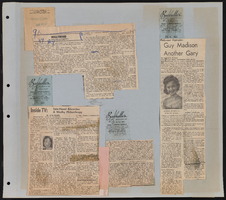Search the Special Collections and Archives Portal
Search Results

Transcript of interview with Fermin De Leon by Generoso E. Sayon, March 15, 1981
Date
Archival Collection
Description
Text
Rinker, C. A. Earle (Cleveland A. Earle), 1883-1965
Cleveland A. Earle Rinker was born in Indiana in 1883 to S. Cleveland Rinker and Isadora (Fenwick) Rinker. Shortly after his twentieth birthday Rinker went to Parker, Indiana, seeking work as a stenographer. He soon began working as a clerk for Thomas Condon, a coal and oil dealer who was also an enthusiastic investor in Nevada gold mines. Condon encouraged Rinker to seek his fortune in the gold fields and, in late October of 1906, Rinker boarded a train to make the journey to Goldfield, Nevada.
Person
Tony Wuehle Collection
Identifier
Abstract
The Tony Wuehle Collection documents the activities of freelance writer, college president, and poker expert Edwin "Tony" Wuehle of Michigan and Las Vegas, Nevada, between the years of 1950 to 2007. The collection consists of copies of Wuehle's regular columns, newsletters, and special articles as they were published in various journals and newspapers, especially those related to poker, the International Home and Private Poker Player's Association (IH3PA), education administration, and religious concerns.
Archival Collection

Carmon Meswarb interview, April 15, 1976: transcript
Date
Archival Collection
Description
On April 15, 1976, Judy Hammer interviewed Carmon Meswarb (b. February 9, 1932 in Cedar Falls, Iowa) about his life as a musician in Las Vegas, Nevada. Meswarb discusses how he ended up in Las Vegas, the musicians union and his time playing in a relief band. Meswarb also delves into the different entertainment acts of the 1950s and 1960s, the big-name performers, the city’s showgirls and racial segregation in entertainment. Moreover, Matson talks about the changing landscape of the city, residential areas and the changed attitude of the Strip. The interview ends with Meswarb discussing the short stint of Broadway shows on the Las Vegas Strip.
Text

Margo Knowles interview, March 25, 1981: transcript
Date
Archival Collection
Description
From the Ralph Roske Oral History Project on Early Las Vegas, OH-01039. On March 25, 1981, collector Sonny Neighbors interviewed his mother, Margo Knowles (born October 13th, 1935 in Cedar Rapids, Iowa) at her home in Las Vegas, Nevada. Margo speaks about growing up and going to school in Las Vegas. She also discusses her work as a telephone operator in Las Vegas, and at the Nevada Test Site in Nye County, Nevada.
Text

Transcript of interview with Joe Lappin by Gordon Brusso, March 4, 1976
Date
Archival Collection
Description
On March 4, 1976, Gordon Brusso interviewed former miner, Joe Lappin (born November 14th, 1914 in Santa Paula, California) about his life in Boulder City, Nevada. The two discuss his early occupational history and his work for the Bureau of Mines. He then goes on to explain the different housing systems that developed in Boulder City during World War Two.
Text

Transcript of interview with Eldon Cunningham by Randall L. Williams, March 14, 1981
Date
Description
On March 14, 1981, Randall Williams interviewed Eldon Cunningham (born 1920 in Granby, Missouri) about his life in Las Vegas, Nevada. Cunningham first talks about his family background, his reason for moving to Las Vegas, and his service in the military during World War II. He also mentions the Twin Lakes area of Las Vegas, his hobby of prospecting, and his work with Clark County Electric as an electrician. Cunningham also talks in detail about some of his experiences while working at the Nevada Test Site in electrical work. As the interview concludes, Cunningham talks more about family illnesses, experiments at the Test Site, and his former hunting practices.
Text

Transcript of interview with Hal G. Curtis by Bill Teepe, February 24, 1977
Date
Archival Collection
Description
On February 24, 1977, Bill Teepe interviewed Hal G. Curtis (born 1926 in Galt City, California) about his life in Southern Nevada. Curtis talks first about his work on the Union Pacific Railroad before discussing changes and development in Las Vegas, including development on the Strip and Downtown areas. He also talks about Block 16, the El Rancho Vegas fire, social clubs, and religion.
Text

Transcript of interview with Mary & Bruce Eaton by Beatrice Scheild, March 8, 1975
Date
Archival Collection
Description
On March 8, 1975, Beatrice Scheid interviewed Mary and Bruce Eaton about their lives in Boulder City, Nevada. Mary first talks about her life in the early days of Boulder City, specifically the influences of the churches and schools. She also talks about housing, transportation, and her career as an educator. Bruce (born 1904 in Toronto, Kansas) also talks about his life in Boulder City and his arrival to Southern Nevada as he sought employment in working on the building of Hoover Dam. Bruce talks about his employment with Six Companies, Inc. and discusses topics such as the employment wages, his and Mary’s experiences in building a house, and their experiences in buying a house built by Six Companies. Bruce also talks about the roles of Sims Ely, the city manager of Boulder City, and Frank Crowe, the construction superintendent of Six Companies. Bruce then discusses the issues of worker’s compensation as it related to work on the dam, and he describes, in detail, the cooling system us
Text

